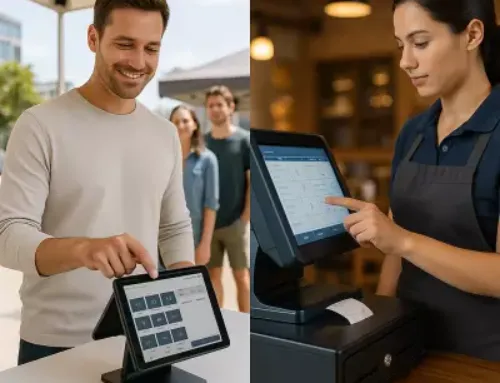Have Questions? Let’s Talk!
Running a successful business requires more than just hard work and determination—it demands the right tools to keep everything running smoothly. At the heart of your operations lies your Point of Sale (POS) system, a critical piece of technology that goes beyond processing transactions. Today’s POS systems integrate seamlessly with inventory management, customer relationship platforms, and real-time reporting to offer a comprehensive solution for streamlining operations and enhancing profitability.
But with so many options available, how do you choose the perfect system for your unique business needs? Whether you’re opening a new location or upgrading an outdated setup, selecting the right POS system can feel overwhelming. The stakes are high, as the right choice can optimize efficiency and transform your business, while the wrong one can lead to unnecessary complications and revenue loss.
In this guide, we’ll walk you through everything you need to know to choose the perfect POS system. From understanding essential features to avoiding common pitfalls, we’re here to help you make an informed decision that positions your business for success. Let’s get started on streamlining your operations and unlocking your full potential!
Why a POS System is Central to Your Business
Your POS system is more than just a way to process payments—it’s the backbone of your daily operations. It touches nearly every aspect of your business, from managing inventory to creating seamless customer experiences. A well-chosen POS system not only simplifies complex processes but also serves as a powerful tool to help you grow and adapt in an ever-changing market.
Your POS system is the lifeline of your business, and its impact cannot be overstated. By understanding its importance and leveraging its full potential, you can create a foundation for long-term success. In the next section, we’ll explore the key features to look for when choosing the perfect POS system for your business.
Key Features to Look for in a POS System
When choosing the perfect POS system, it’s essential to focus on features that align with your business goals and operational needs. The right system will not only streamline your processes but also enhance customer satisfaction and support your growth. Here are the key features to prioritize:
1. Ease of Use
Your POS system should be intuitive and user-friendly for your team, regardless of their technical expertise. A simple interface reduces training time, minimizes errors, and ensures smooth day-to-day operations. Look for systems with straightforward navigation, customizable workflows, and clear reporting.
2. Integration Capabilities
A robust POS system integrates seamlessly with your other tools, such as accounting software, e-commerce platforms, inventory management systems, and marketing solutions. This integration ensures data flows smoothly across your business, reducing manual effort and improving accuracy.
3. Customization and Flexibility
Every business is unique, and your POS system should reflect that. Whether you need table management for a restaurant, membership tracking for a gym, or retail-specific features like barcode scanning, ensure the system can be tailored to your industry’s specific requirements.
4. Mobile and Cloud-Based Functionality
Modern businesses thrive on mobility and flexibility. A mobile POS system allows you to process transactions anywhere, from tableside payments in restaurants to pop-up shops or delivery services. Cloud-based systems also provide real-time access to your data from any device, keeping you informed and agile.
5. Security and Data Protection
Protecting your business and customer data is non-negotiable. Look for systems that include features like data encryption, secure payment processing, and automated backups. Advanced security protocols safeguard your operations and give your customers peace of mind.
6. Advanced Reporting and Analytics
Your POS system should do more than track transactions—it should provide actionable insights into your business. Features like real-time sales reports, inventory tracking, and customer behavior analysis can help you make smarter, data-driven decisions.
7. Support and Maintenance
Even the best POS systems encounter issues. Choose a provider that offers 24/7 technical support, proactive monitoring, and ongoing updates to keep your system running smoothly. Reliable support ensures minimal downtime and quick resolution of any problems.
By focusing on these critical features, you can select a POS system that not only meets your current needs but also adapts as your business grows. In the next section, we’ll discuss how to evaluate your unique business requirements to ensure the system you choose is the perfect fit.
Evaluating Your Business Needs
Choosing the right POS system begins with a clear understanding of your business’s unique requirements. A well-matched system should address current challenges, align with your goals, and provide the flexibility to grow alongside your business. Here’s how to evaluate your needs effectively:
Analyze Your Current Operations
Take stock of your existing processes and systems. Identify areas where inefficiencies occur—whether it’s inventory management, reporting, or customer checkouts. Understanding what isn’t working is the first step to finding a solution.
Questions to Consider:
- What are the most time-consuming tasks for your staff?
- Are there recurring issues with transaction processing or system downtime?
- How well does your current system handle peak times or high transaction volumes?
Define Your Goals
What do you hope to achieve with a new POS system? Whether it’s faster checkout times, better inventory tracking, or enhanced customer loyalty programs, having clear objectives will help you focus on the features that matter most.
Common Goals:
- Streamlining daily operations
- Improving customer experience
- Gaining better insights into business performance
- Expanding to new locations or sales channels
Understand Your Industry-Specific Needs
Different industries have different demands. For instance, restaurants may require table management and kitchen display systems, while retail businesses may need robust inventory control and barcode scanning. Tailor your search to solutions designed for your sector.
Set a Budget
Determine your budget not just for the initial setup but also for ongoing costs like software subscriptions, hardware maintenance, and upgrades. While it’s tempting to focus solely on upfront costs, consider the long-term value and return on investment a quality system provides.
Cost Considerations:
- Are hardware costs included in the package?
- What are the subscription or licensing fees?
- Does the provider offer free software updates or charge for upgrades?
Leverage Expert Advice
Sometimes, it’s helpful to seek guidance from professionals. Many providers, like SORA Partners, offer free consultations to assess your business needs and recommend tailored solutions. Their expertise can save you time and ensure you’re making an informed decision.
Involve Your Team
Your staff will be using the system daily, so their input is invaluable. Involve them in the evaluation process to ensure the chosen system is practical and user-friendly for everyone.
By taking the time to thoroughly evaluate your business needs, you’ll set the foundation for selecting a POS system that truly fits. In the next section, we’ll explore common mistakes to avoid during the selection process to ensure you make the best choice.
Common Mistakes to Avoid When Choosing a POS System
Selecting the perfect POS system is a significant decision, and avoiding common pitfalls can save you from unnecessary headaches and expenses down the road. Here are some mistakes to steer clear of during your selection process:
1. Focusing Solely on Price
While it’s natural to consider cost, choosing a system based solely on price often leads to sacrifices in functionality, reliability, and support. Low-cost options might lack essential features, require costly add-ons, or have hidden fees for updates, licenses, or maintenance. Over time, these compromises can result in higher expenses and missed opportunities to improve your operations.
Why It Matters: A budget-friendly system that doesn’t meet your needs may cause inefficiencies, lower staff productivity, and customer dissatisfaction—ultimately affecting your bottom line.
Tip: Evaluate total cost of ownership, including hardware, software, and support fees, to understand the complete financial impact.
2. Overlooking Support and Maintenance
Even the most advanced POS systems can experience technical glitches. Without reliable support, these issues can lead to prolonged downtime, lost sales, and frustrated customers. Some systems only offer limited support hours or charge extra for critical services, leaving you vulnerable during high-pressure times.
Why It Matters: Dependable support ensures that any issues are resolved quickly, minimizing disruptions to your operations. Providers like SORA Partners offer live technical support, proactive monitoring, and rapid issue resolution, so you can stay focused on your business.
Tip: Look for providers with 24/7 support, proactive maintenance, and a clear plan for ongoing updates and system optimization.
3. Ignoring Future Scalability
Many businesses make the mistake of choosing a system that meets their current needs but fails to accommodate growth. As your business expands—whether through additional locations, new product lines, or higher transaction volumes—a rigid system can become a bottleneck.
Why It Matters: Scalability ensures your POS system can grow with your business, saving you from needing a costly replacement or complex upgrades in the future.
Tip: Choose a system with flexible features and pricing plans that accommodate your business’s evolution.
4. Skipping Staff Input
Your staff will interact with the POS system daily, yet their insights are often overlooked during the selection process. A system that’s difficult to navigate or doesn’t address common workflow challenges can lead to frustration, inefficiencies, and errors during transactions.
Why It Matters: Including your team in the decision-making process ensures the chosen system is practical and user-friendly. Their buy-in also makes adoption and training smoother.
Tip: Involve staff in the demo and testing process to ensure the system is intuitive and practical for daily use.
5. Overlooking Integration Capabilities
A standalone POS system that doesn’t integrate with other essential tools, like inventory management, accounting software, or e-commerce platforms, creates operational silos. This can lead to time-consuming manual work, data discrepancies, and inefficiencies across departments.
Why It Matters: Seamless integration allows data to flow smoothly across your business, improving accuracy and saving time. It also enables better reporting and decision-making by consolidating data from multiple sources.
Tip: Ensure the POS system seamlessly integrates with your existing tools or offers APIs for custom integrations.
6. Neglecting Security Features
In today’s digital world, data breaches can have devastating consequences for your business, from financial losses to reputational damage. A POS system without robust security measures puts both your business and customer data at risk.
Why It Matters: Strong security features, like data encryption, secure payment processing, and automated backups, protect your operations and build customer trust. Compliance with industry standards ensures your system is up-to-date with the latest security protocols.
Tip: Choose a system with robust security protocols, including data encryption, secure backups, and compliance with industry standards.
7. Failing to Test the System Thoroughly
Many businesses get swayed by a polished demo or sales pitch but fail to evaluate the system under real-world conditions. Without thorough testing, you might end up with a system that performs well in theory but doesn’t address the practical demands of your operations.
Why It Matters: A system that falls short during daily use can disrupt workflows, slow down transactions, and frustrate staff and customers alike.
Tip: Request a trial period or hands-on demo to evaluate the system’s performance in your business environment.
By understanding and avoiding these common mistakes, you’ll be better equipped to choose a POS system that delivers long-term value and supports your business’s success.
Let’s Elevate Your Business Together
We’re here to help you navigate the latest trends, adopt innovative solutions, and tackle your biggest challenges. Whether you’re exploring POS systems, managed IT services, or website design, our experts are ready to provide tailored guidance for your business.
Fill out the form below to schedule your free consultation. Let’s create a solution that works for you.



